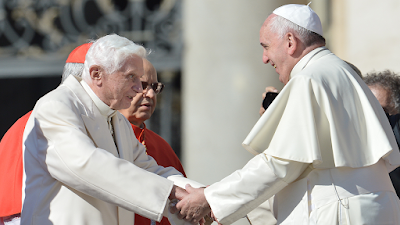 |
| Pope Emeritus Benedict passed away in the Vatican City. |
The Vatican announced the passing of Pope Emeritus Benedict XVI at the age of 95.
President Joe Biden, Vice President Kamala Harris, Congress, Prime Minister Justin Trudeau, Prime Minister Rishi Sunak, King Charles III, Valdimir Putin, Emmanuel Macron and the world leaders will respond in due time.
Benedict lived at the Mater Ecclesiae Monastery in Vatican City following his retirement, where he continued to write and pray until his death.
Benedict pushed for greater cooperation and ecumenical dialogue between the Catholic Church and other religions, most notably Islam and Judaism. He also encouraged greater understanding and reconciliation with Protestant churches, despite a firm rejection of Protestant theology.
The pope viewed Christianity as a logical reality that could be studied and slowly understood piece by piece. He expressed approval for the Theory of Evolution, reminding Catholics that science was not at odds with religion and that Genesis was not considered a straightforward text by early Christian communities.
He is most immediately remembered outside the Catholic Church for his surprise resignation — the first papal abdication since 1415 — and subsequent life as the world’s first "pope emeritus" in centuries.
Benedict was born Joseph Ratzinger on April 16, 1927, in Bavaria. He came of age in Germany after World War I at the same time the Nazi regime was growing in power.
His Roman Catholic family — harassed and punished by the Nazi Party for their opposition to state policies — shaped his desire to commit to the church.
Pope Benedict XVI was a staunch traditionalist associated with the Catholic Church. He was more conservative than his successor Pope Francis.
Francis is considered more moderate than Francis and Saint John Paul II.
Ratzinger was inspired to join the priesthood at an early age when he was tasked with presenting flowers to Archbishop Michael von Faulhaber of Munich. Seeing the clergyman’s crimson robes and refined demeanor, the five-year-old Ratzinger declared he would become a cardinal.
"It was the way the cardinal looked, his bearing, and the knickerbockers he was wearing that made such an impression on him," his brother Georg recalled in a 2005 interview with the New York Times.
At the age of 14, Ratzinger was mandated by law to become a member of the Hitler Youth alongside all other German children of his age group. Ratzinger resented the organization and became horrified after his cousin, who suffered from Down’s syndrome, was abducted and killed by the government as part of their Aktion T4 campaign.
Despite entering seminary, Ratzinger was drafted into the anti-aircraft corps in 1943 and later into the regular military during World War II. He deserted the German military in April 1945.
Benedict said that he chose to abandon the military after witnessing the horrors of the war, including Jews in Hungary being sent to death camps, according to an interview with Time Magazine in 1993.
He was captured and held as a prisoner of war by American forces for several months before returning to Germany and re-entering the seminary with his brother, Georg.
 |
| Pope Francis saw Benedict as a spiritual mentor and friend. |
Ratzinger and his brother were ordained on the same day in 1951, receiving Holy Orders from the same cardinal who had inspired Benedict’s decision to enter the priesthood as a child.
His extensive work in theology and Christology saw him promoted to Archbishop of Munich and Freising in May 1977. He was then swiftly promoted to cardinal by Pope Paul VI in June of the same year.
Cardinal Ratzinger built a positive reputation in Catholic circles for his intense scholarship and prolific writing career.
His bibliography — volumes of works that span from his earliest years of the priesthood through his papacy and beyond — includes encyclicals on morality, explorations of the life of Jesus, and retrospective looks at church history.
Perhaps one of his most profound early contributions included founding the theological journal Communio, which became one of the most important journals of Catholic thought in his home country.
He was also among the vanguard in tackling the issue of sexual abuse in the Catholic Church while serving as a cardinal under Pope St. John Paul II.
Pope Francis has been a fervent supporter of Benedict and has spoken highly of his predecessor as both a theologian and a priest.
The two have been photographed together frequently, celebrating holy days, and attending events. The pair of popes often prayed together, and Benedict spoke approvingly of his successor in rare interviews.
Benedict even attended Pope Francis’s ceremony appointing 19 new cardinals in 2014.
No comments:
Post a Comment